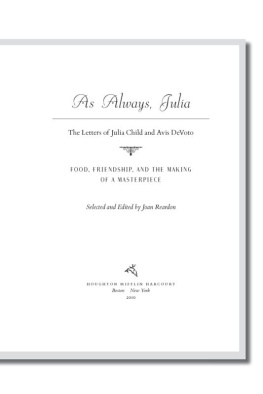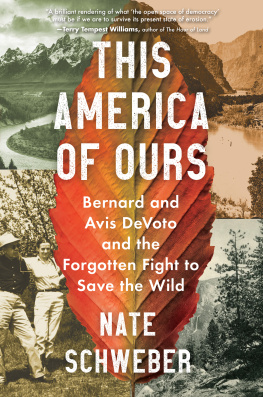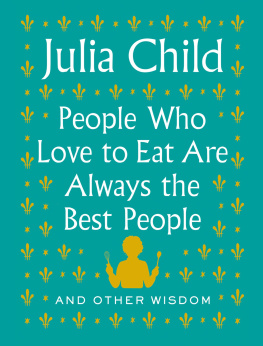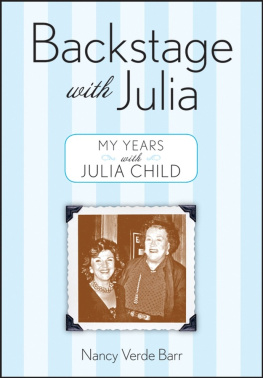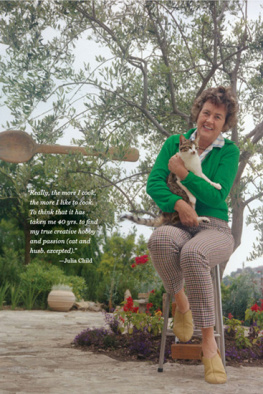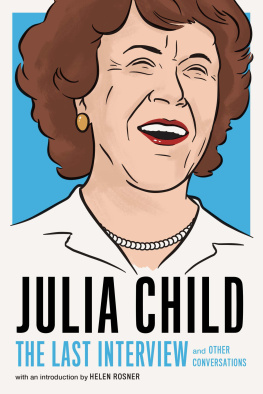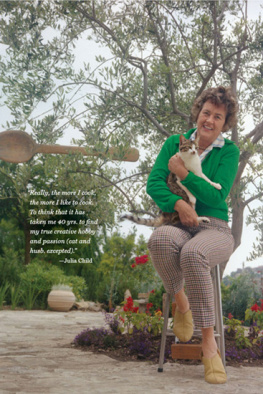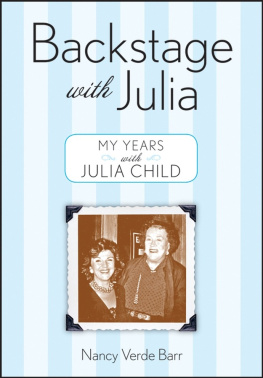Copyright 2010 by Joan Reardon
ALL RIGHTS RESERVED
For information about permission to reproduce selections from this book, write to Permissions, Houghton Mifflin Harcourt Publishing Company, 215 Park Avenue South, New York, New York 10003.
www.hmhbooks.com
Library of Congress Cataloging-in-Publication Data
As always, Julia : the letters of Julia Child and Avis DeVoto : food, friendship, and the making of a masterpiece / selected and edited by Joan Reardon.
p. cm.
Includes index.
ISBN 978-0-547-41771-4
1. Child, JuliaCorrespondence. 2. De Voto, AvisCorrespondence. 3. CooksUnited StatesCorrespondence. I. Reardon, Joan, date. II. Child, Julia. III. De Voto, Avis.
TX 649. C 47 A 4 2010
641.5092dc22 2010025840
Book design by Melissa Lotfy
Printed in the United States of America
DOC 10 9 8 7 6 5 4 3 2 1
The letters of Julia Child are used with the permission of the Julia Child Foundation for Gastronomy and the Culinary Arts.
The letters of Avis DeVoto are used with the permission of Mark DeVoto.
The letters of Julia Child and Avis DeVoto are courtesy of the Schlesinger Library, Radcliffe Institute for Advanced Study, Harvard University, from the following collections: Avis DeVoto Papers and Julia Child Papers.
pages : The Julia Child Foundation for Gastronomy and the Culinary Arts; photographs by Paul Child; used by permission.
: photograph by C. H. Dykeman; courtesy Mark DeVoto.
: Rigmore Delphin, Alle Kvinners Blad.
All other photographs Paul Child and used by permission of the Schlesinger Library, Radcliffe Institute, Harvard University.
To the trustees, administrators, and staff of the Schlesinger
Library at Harvard University, whose vision made available
the letters and special collections that have made all of my
publications possible, including As Always, Julia.
And to William Truslow, the trusted lawyer, friend, and
custodian of Julia Child's legacy, and Mark DeVoto, the
beloved and accomplished son of Avis DeVoto.
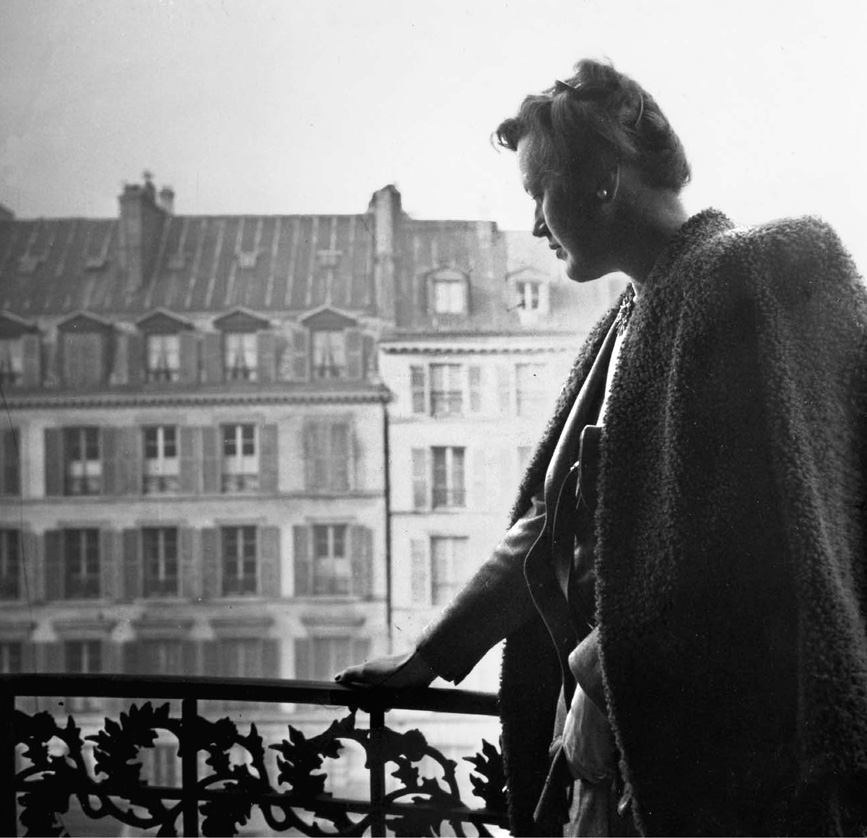
Julia views Paris from the balcony of the Htel Pont Royale after her arrival in 1948.
Introduction
A letter truly belongs to the sender and the recipient, and to encroach on their privacy, in effect to eavesdrop over their shoulders, seems to me an intrusion of their personal exchange. But when a group of letters tells a terrific storycreates a complex narrative of professional growth, deep curiosity, and culinary awakeningit's important, yes, even imperative, to open those envelopes again and look at what the correspondence reveals.
The letters included in this collection begin when Julia Child was living in Paris with her husband, Paul, and wrote a fan letter to Avis DeVoto's husband, Bernard, which Avis answered. They continue until 1961, when volume 1 of Mastering the Art of French Cooking was published. Beyond telling the warm and human story of a friendship between two dynamic women, they document the evolution of the book from its inception to its publication. They cover a wide range of other topics as well, including the various foods that were available in the United States at the time and their quality; other cookbooks and magazine recipes; the pitfalls and successes of a career in the foreign service; the national temperament and character of the French, Germans, Norwegians, and English; even the Kinsey Reports on human sexualityall juxtaposed against the hysteria of the McCarthy era and the general political climate of the 1950s and 1960s, mirroring to a surprising degree some of the issues of the current American scene.
Julia, of course, remains a culinary icon, and her rise to fame is familiar. But the woman everybody claims to know is not the one we see here. Julia's letters to Avis reveal the ups and downs of her early efforts to "translate the genuine taste of French cooking into American." She was comfortable writing to Avis about her developing professionalism and the personal toll that Paul's multiple postings took on her cookbook project. Alternately self-assured and self-doubting, she is always genuine, witty, and highly opinionated. We see her during moments of frustration and fulfillment, disillusion and delight.
Avis was Julia's confidante, the one to whom she could write, "For a while, what with all this moving and settling I was becoming frantic, schizophrenic, and even, perhaps, necrophilic, combined with anguish, frustration and ill-temper. But, finally getting into the book-work again, I find I work awfully slowly. There is so much that has been written, by people so much more professional than I, that I wonder what in the hell I am presuming to do, anyway." Avis was also the person whom Julia admired, cajoled, leaned on, complained to, identified with, and considered a partner in her culinary efforts. When Julia exchanged photos with Avis early in their correspondence, she wrote that Avis's face was the one that "I always try to wear when I am in New York, with no success."
One of Bernard DeVoto's students at Harvard described Avis as "very good looking and very sexy-seeming and the only faculty wife who might have said 'horseshit' even to [Harvard] President Lowell." She was the mainstay of and secretary to her husband, the mother of two sons, a reviewer of whodunits for the Boston Globe, an editor, an accomplished cook, and a Bread Loaf Writers' Conference regular. When she answered Julia's first letter to Bernard, it was the beginning of what would perhaps be the most important chapter in her life as the inspiration and soul mate of writers and the ultimate facilitator.
After Bernard died in November 1955, Avis scouted for Alfred A. Knopf, read manuscripts for Houghton Mifflin, was house secretary at Harvard's Lowell House, and held a position in the dean's office at Radcliffe College. In 1970, Knopf asked her to proofread volume 2 of Mastering the Art ofFrench Cooking. A year later, she joined the staff of WGBH, Boston's public TV station and home to Julia's cooking show, The French Chef. As a member of Julia's television team, she organized Julia's fan letters and assisted in the production of three more shows after the series ended. She was Julia's Cambridge connection when Julia resided at her home in the South of France or traveled around the United States.
Early on, both Paul and Julia recognized that their friendship with Avis offered an opportunity to be part of the Cambridge social scene. At their legendary Sunday afternoon cocktail parties, the DeVotos associated with the Kenneth Galbraiths, the Arthur Schlesingers, and many other members of the Harvard intelligentsia. Paul had lived in Boston when he was young, and Julia felt a kinship with Massachusetts as her mother's birthplace and because of her own years at Smith College. To live in Cambridge when Paul retired from the State Department became a goal that the Childs enthusiastically embraced, and Avis made it happen. After the Childs took up residence there in 1961, telephone conversations and close personal contact largely replaced Julia's and Avis's frequent letters.
What emerges from this collection are portraits of two notable women and their ambient worlds, which amazingly capture the cultural landscape of America in the 1950s and 1960s. Read from beginning to end, these letters also provide insights into the expanding role of women, who were just beginning to achieve recognition and pursue meaningful careers apart from their husbands' positions or fame. It is a compelling story.
Editor's Note
The year was 2006, and lilacs bloomed along Brattle Street. Every day for a week, I made my way to the welcoming Schlesinger Library in Cambridge, Massachusetts, to read Julia Child's letters to Avis DeVoto. Archived in the Avis DeVoto Papers, they had been sealed for thirty years. Now, inventoried and cataloged, they were open to readers.
Next page
